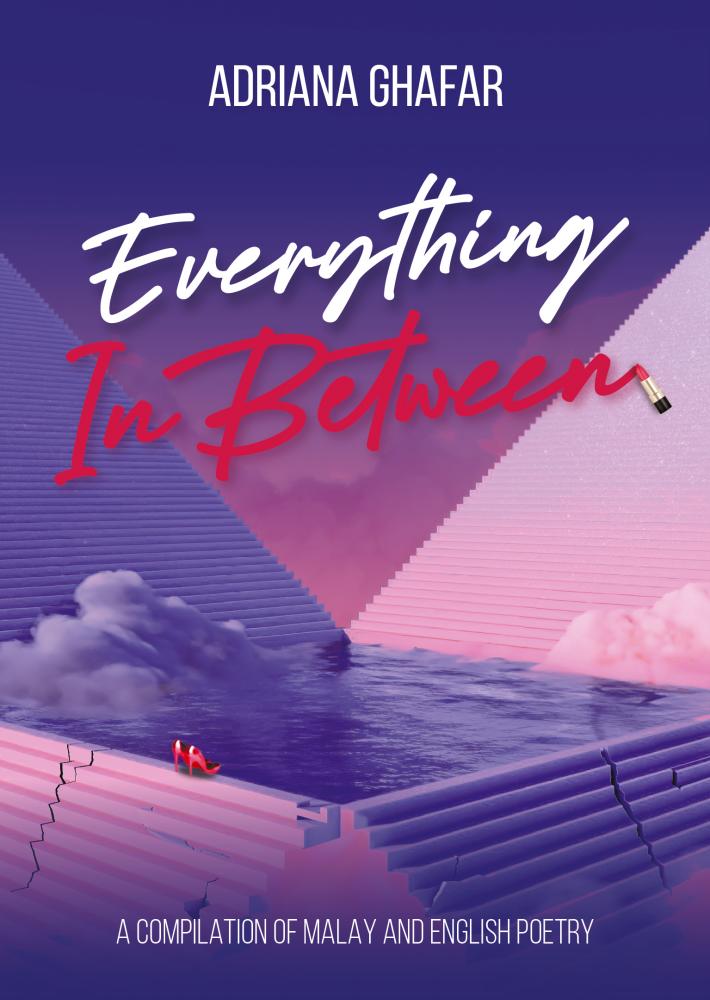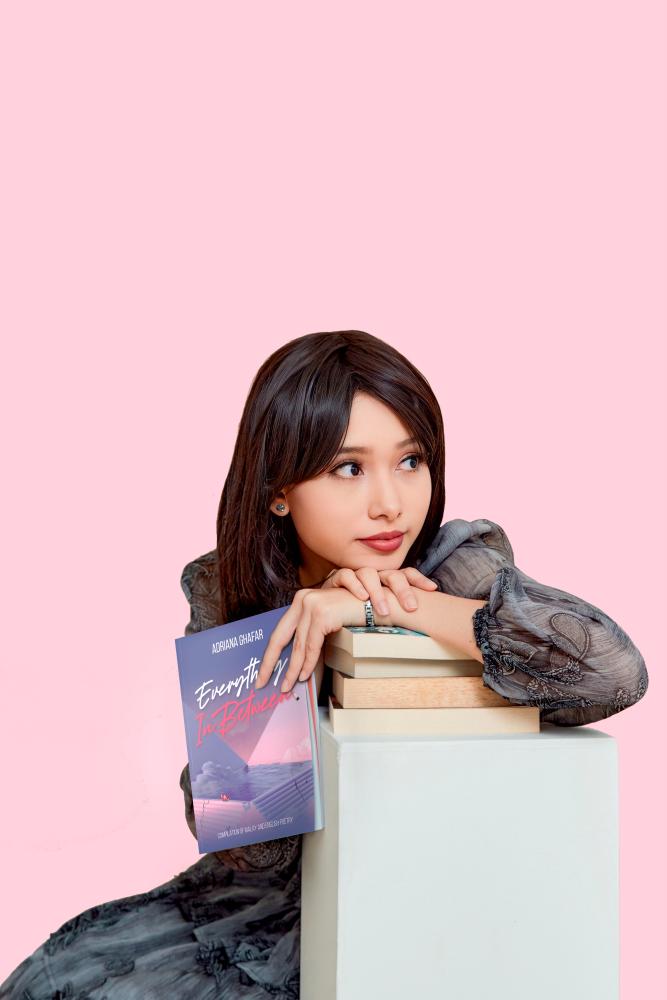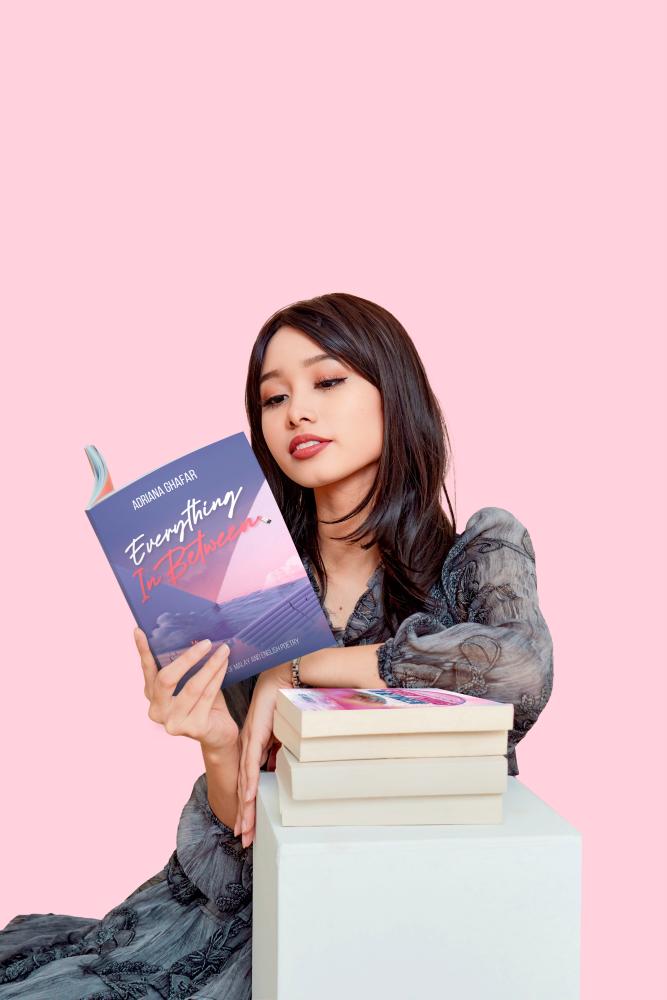RISING to prominence as the first runner-up in the 2019 Dewi Remaja competition, Adriana Ghafar has since become an increasingly visible presence in Malaysia’s entertainment scene. Now, she is on the cusp of a new milestone with the release of her highly anticipated collection of poetry, Everything In Between, which is scheduled to be released tomorrow.
Marking her literary debut, Everything In Between blends Malay and English poetry to explore themes of love, family, rejection and resilience.
With a message of empowerment, the book aims to inspire young adults to navigate life’s challenges, encouraging them to embrace their inner strength and believe in themselves.
Adriana, whose full name is Nur Nafissa Adriana Abdul Ghafar, began her poetic journey in school.
The 26-year-old draws creative inspiration from celebrated international writers like Maya Angelou, Sharon Olds and Emily Dickinson, alongside revered local poets such as A. Samad Said, Khadijah Hashim, and Bernice Chauly.
Since her rise to fame in the Dewi Remaja competition, Adriana has excelled as an emcee, model, actress and news anchor.
Currently pursuing her legal career as a chambering student, the young talent now adds another dimension to her multifaceted persona as a poet and author.
In an interview with theSun, Adriana opens up about the motivations behind her poetry and shares insights into her journey in the industry:
What is your inspiration behind writing Everything In Between?
Everything In Between, a project 12 years in the making, is a reflection of my joys, struggles, triumphs and vulnerabilities. My inspiration comes from my life’s journey, from my humble student days to the glamour of pageant wins and national television, and now, to the grind of being an aspiring lawyer.
My love for poetry started many years ago while I was still at school, and writing a poetry book has always been a dream of mine.
As I’ve grown up, I’ve experienced a range of emotions and poetry has been my go-to outlet for expressing them.
Writing this book is a way for me to reflect on my experiences, accomplishments, and thoughts.
Some of the poems are also influenced by those around me or my perspective on various topics in life.
Why did you choose to portray these main themes: Love, family, rejection, resilience and female empowerment in your book?
These topics resonate deeply with me and everyone as we navigate through life. Life has its ups and downs, but through these experiences, we learn to strive and flourish as individuals.
For instance, rejection makes us stronger and more resilient. Love and family are essential, providing us with the support and motivation to persevere through challenges.
Female empowerment has been a cause close to my heart ever since a personal experience I had as a teenager.
One day, on the bus ride home from school, I witnessed a harrowing event: a couple was engaged in a heated argument that escalated into a physical assault on the wife. Only an elderly lady dared to stand up, threatening to involve the authorities. Tragically, the abuse persisted until the bus driver intervened, leaving the woman semi-conscious. This haunting memory remains with me to this day.
Therefore, I need to continue voicing these stories through poetry, as it reflects the ongoing struggles of unheard voices.
All the themes from my book encapsulate the essence of the human experience which are deeply relevant to each of us.

How do you envision democratising poetry in Malaysia and what steps you have taken towards it?
My vision is to break the stereotype that poetry is exclusive to the intellectual elite. I envision creating accessible platforms and opportunities for individuals from diverse backgrounds to engage with and participate in poetry.
Already, several people have reached out, expressing their love for poetry and their desire to publish books, marking the beginning of a community united by our shared passion and goals.
Building on this community initiative, I hope to organise poetry slams, workshops, open mic events and contests to support these budding poets, particularly those from marginalised backgrounds.
Also, I would leverage digital platforms and social media to share poetry content, provide resources for aspiring poets, and connect poets with audiences nationwide. By implementing these approaches, I aim to enhance the accessibility, inclusivity, and relevance of poetry to people from diverse backgrounds, thereby democratising its appreciation and creation.
How has becoming the first runner-up in Dewi Remaja 2019 impacted your life?
Winning the first runner-up title has certainly opened many doors for me in the entertainment and fashion industry, allowing me to collaborate with renowned brands and talented professionals. I am forever grateful for this.
Beyond career advancements, I recognise that my Dewi Remaja win has given me a significant platform to advocate for causes I am passionate about. This opportunity has transformed my life, providing me with a greater sense of purpose, especially in raising awareness and educating the public on important issues.
This role comes with a much busier schedule, requiring me to juggle various commitments and maintain a high level of productivity. I’m also much more conscious about every action and statement I make, knowing they are subject to public scrutiny. I strive to consistently present the best version of myself.
What are your thoughts on the current title holder of the Dewi Remaja contest?
Nurel Baharin embodies a remarkable blend of beauty, intelligence, and talent, poised to make a significant impact in the industry. I see her as a role model for aspiring young women everywhere.
With her potential, she is not only set for personal success but also for inspiring and uplifting others along the way. Her journey is just beginning, and it is exciting to see how she will continue to influence and shape the industry in the years to come.
What are your expectations for the future?
In the future, I aim to grow as a writer and individual, expanding my reach to inspire and connect with a broader audience. My goal is to democratise poetry, making it accessible to everyone, by breaking down barriers that confine it to academic or elite circles. Integrating poetry into digital platforms, social media, and multimedia projects will be crucial for engaging the younger generation.
Secondly, I see poetry being used more actively for social change and advocacy, amplifying marginalised voices and highlighting issues like gender equality. Poets will continue to lead movements for justice and empowerment.
Ultimately, I aspire to leave a lasting impact on the literary landscape, emphasising bilingual and multilingual poetry that celebrates Malaysia’s linguistic diversity, bridging cultural gaps, and fostering unity among communities.










